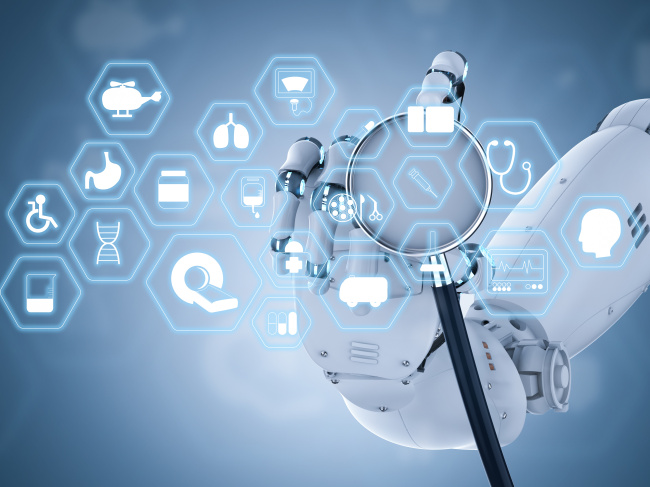Korea to invest W42b in next-gen medical devices powered by AI, robotics
By Sohn Ji-youngPublished : July 24, 2018 - 14:54
The South Korean government on Tuesday kicked off a new joint initiative to speed up the development of next-generation medical devices powered by artificial intelligence and robotics, launched as part of the country's “bio economy” drive, the Science Ministry said.
As part of the initiative, the Ministry of Science and ICT, together with the Ministry of Trade Industry and Energy, the Ministry of Food and Drug Safety and the Ministry of Health and Welfare, will be allocating 42 billion won ($36.97 million) to nine selected research teams over the course of five years.
Each team will work on developing globally competitive products that fall in the categories of AI-powered implantable medical devices, smart disease diagnostics or treatment solutions and AI-based medical robotics systems.
As part of the initiative, the Ministry of Science and ICT, together with the Ministry of Trade Industry and Energy, the Ministry of Food and Drug Safety and the Ministry of Health and Welfare, will be allocating 42 billion won ($36.97 million) to nine selected research teams over the course of five years.
Each team will work on developing globally competitive products that fall in the categories of AI-powered implantable medical devices, smart disease diagnostics or treatment solutions and AI-based medical robotics systems.

The pan-government initiative seeks to pool the currently scattered resources of each ministry, and to streamline the medical device development process from start to finish.
The Science Ministry will oversee the basic research and technology development process, while the Industry Ministry will support the initial prototype and commercially viable product development procedures.
Meanwhile, the Health Ministry will support the clinical trial planning and execution aspect. The Drug Ministry, the body in charge of approving new medical devices, will support the marketing authorization procedures.
“The global medical device sector has been showing a rapid growth of more than 5 percent annually, fueling heavy government investment into the sector,” the Science Ministry said.
“However, there have been complaints that funding has been scattered across multiple ministries, and that the steps involved in the medical device development process are in many ways disconnected, hurting efficiency. To address such issues, this pan-government initiative was launched,” the ministry said.
Under this system, different ministries can prepare in advance the relevant approval and insurance policy guidelines concerning a new generation of medical device technologies. Doing so would ensure that approvals do not get delayed due to a lack of a legal precedent, it explained.
The selected nine medical devices in development are all next-generation products that have applied AI and robotics technology to existing medical devices, to improve or build on their original functions.
For instance, one team is developing prosthetic hands that can be directly implanted into a patient’s bones. The prosthesis would be designed to specification via 3D printing, and able to perform diverse functions in accordance with a patient’s biological signals analyzed via AI algorithms.
Another product in the works is a cranial nerve rehabilitation device that uses virtual reality and brainwave tracking technologies, designed for independent use by stroke patients trying to regain motor control.
Using specially developed VR content, patients would be able to partake in rehab activities on their own, as their progress would be recorded automatically via algorithms that monitor and track brain activity.
Looking ahead, the four ministries are working to further integrate independent medical device development support projects into a single pan-government program by 2020.
By Sohn Ji-young (jys@heraldcorp.com)


![[Exclusive] Korean military set to ban iPhones over 'security' concerns](http://res.heraldm.com/phpwas/restmb_idxmake.php?idx=644&simg=/content/image/2024/04/23/20240423050599_0.jpg&u=20240423183955)

![[Graphic News] 77% of young Koreans still financially dependent](http://res.heraldm.com/phpwas/restmb_idxmake.php?idx=644&simg=/content/image/2024/04/22/20240422050762_0.gif&u=)



![[Pressure points] Leggings in public: Fashion statement or social faux pas?](http://res.heraldm.com/phpwas/restmb_idxmake.php?idx=644&simg=/content/image/2024/04/23/20240423050669_0.jpg&u=)









